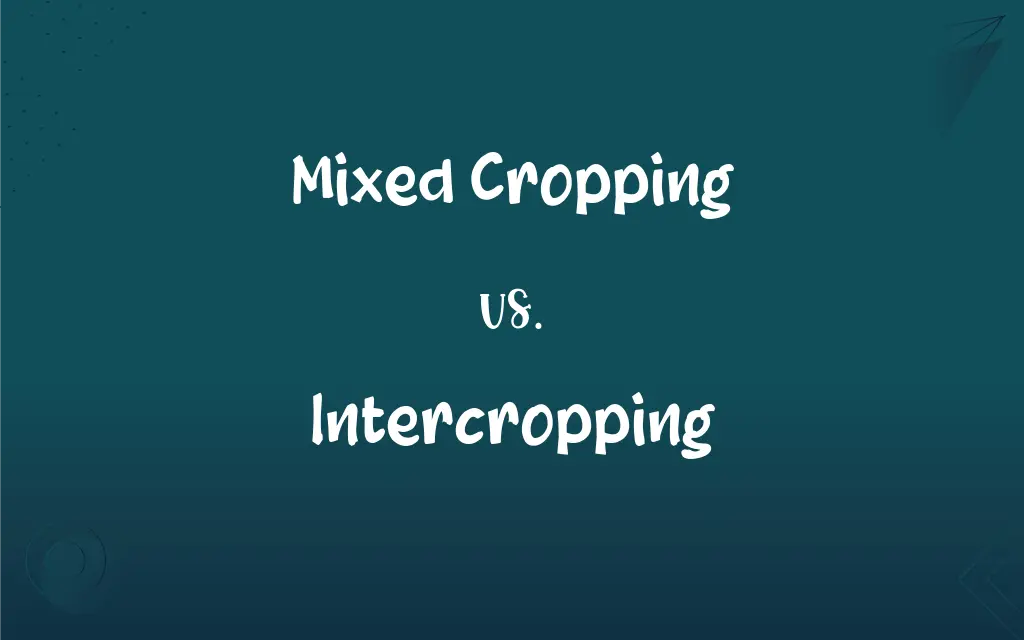Mixed Cropping vs. Intercropping: What's the Difference?
Edited by Janet White || By Harlon Moss || Updated on October 25, 2023
Mixed cropping involves growing two or more crops together without a specific pattern; intercropping grows them in a specific arrangement or sequence.

Key Differences
Mixed cropping and intercropping are both agricultural practices that involve growing more than one crop on the same piece of land during a single growing season. Mixed cropping typically entails sowing two or more types of crops simultaneously without any distinct pattern, allowing them to grow together. This practice ensures that even if one crop fails, the other might give a yield, safeguarding against total crop failure.
Intercropping, on the other hand, follows a specific arrangement or sequence. The crops are sown in alternating rows or other deliberate patterns to maximize the use of available resources. This arrangement allows each crop to benefit from its neighboring plant, either through nutrient sharing, pest control, or otherwise.
Both mixed cropping and intercropping aim to enhance yield, diversify output, and optimize the use of resources. However, the distinction lies in their approach. While mixed cropping is a bit haphazard in its implementation, intercropping is systematic. The specific arrangement in intercropping can help in efficient utilization of nutrients, water, and sunlight.
Furthermore, mixed cropping primarily focuses on safeguarding against total crop loss by diversifying the crops grown. In contrast, intercropping often targets optimizing mutual benefits between crops, such as one crop repelling pests that might affect the neighboring crop or one crop helping to enrich the soil for another.
A common thread between mixed cropping and intercropping is their ability to reduce the risk of crop failure due to pests, diseases, or adverse weather conditions. Both practices can also improve soil fertility, reduce erosion, and enhance biodiversity in a farming system. Yet, the planned nature of intercropping usually requires a more detailed understanding of the crops' interactions and their specific requirements.
ADVERTISEMENT
Comparison Chart
Definition
Growing multiple crops without specific pattern.
Growing crops in a specific arrangement or sequence.
Arrangement
Haphazard.
Systematic and deliberate.
Primary Objective
Safeguard against total crop failure.
Optimize mutual benefits between crops.
Resource Utilization
General optimization of resources.
Efficient utilization through planned arrangement.
Knowledge Requirement
Basic knowledge of the crops grown.
Detailed understanding of crop interactions and requirements.
ADVERTISEMENT
Mixed Cropping and Intercropping Definitions
Mixed Cropping
Mixed cropping aims to reduce risks of total crop failure.
By using mixed cropping, the farmer safeguarded against unpredictable weather conditions.
Intercropping
Intercropping requires understanding crop interactions.
Effective intercropping of beans and maize requires knowledge of their growth patterns.
Mixed Cropping
Mixed cropping often doesn't follow a deliberate pattern.
The field exhibited a random mix of crops, indicative of mixed cropping.
Intercropping
Intercropping involves growing two or more crops in proximity in a specific arrangement.
Her farm showcased maize and beans in alternate rows, a method of intercropping.
Mixed Cropping
Mixed cropping is the simultaneous cultivation of multiple crops.
He practiced mixed cropping by sowing maize and beans together.
Intercropping
Intercropping aims to exploit interactions between crops.
By intercropping marigold and vegetables, she reduced the pest attacks on the veggies.
Mixed Cropping
Mixed cropping diversifies crop output.
Mixed cropping ensured that even when the wheat failed, the barley thrived.
Intercropping
Intercropping can improve nutrient uptake and reduce competition.
Intercropping legumes with cereals enhanced nitrogen availability for the cereals.
Mixed Cropping
Mixed cropping can enhance soil fertility.
Through mixed cropping, the legumes enriched the soil for the cereals.
Intercropping
Intercropping often follows a systematic approach.
The farm had a neat pattern of alternating crops, a sign of intercropping.
Intercropping
To grow more than one crop in the same field, especially in alternating rows or sections.
Intercropping
To plant (a crop) in the same field with another.
Intercropping
Infl of intercrop
FAQs
What is the primary objective of mixed cropping?
Mixed cropping aims to diversify output and safeguard against total crop failure.
Can mixed cropping enhance soil fertility?
Yes, certain combinations in mixed cropping can help improve soil fertility.
Does mixed cropping follow a set pattern?
No, mixed cropping is typically more haphazard without a distinct pattern.
Is intercropping more resource-intensive than mixed cropping?
Intercropping requires a more detailed understanding of crop interactions but can lead to efficient resource utilization.
Is mixed cropping less labor-intensive?
It can be, as it doesn't require the systematic planning and execution of intercropping.
Which practice, mixed cropping or intercropping, is older?
Both practices are ancient, but mixed cropping is likely older due to its less structured approach.
How does intercropping improve nutrient availability?
Intercropping complementary crops can lead to mutual nutrient enrichment, like legumes fixing nitrogen for cereals.
How does intercropping differ in its approach?
Intercropping follows a specific arrangement or sequence, focusing on mutual benefits between crops.
Can I practice both mixed cropping and intercropping on the same farm?
Yes, but it requires careful planning to ensure both practices are effectively implemented.
Is intercropping suitable for all crops?
Not all crops are suitable for intercropping; understanding of crop interactions and requirements is essential.
Does mixed cropping require specific soil types?
No, but understanding the soil's suitability for the chosen crops is essential.
How does intercropping contribute to sustainable agriculture?
Intercropping can enhance resource utilization, improve soil health, and increase biodiversity, supporting sustainable practices.
Which method, mixed cropping or intercropping, is better for pest control?
Both can aid in pest control, but intercropping can be more effective if crops with complementary pest-repellent properties are chosen.
What are the challenges of intercropping?
Challenges include managing different growth rates, ensuring balanced nutrient uptake, and preventing competition.
How does mixed cropping impact biodiversity?
Mixed cropping can enhance biodiversity by introducing a variety of crops to the ecosystem.
Can I use machinery for intercropping?
Yes, but machinery should be chosen considering the specific requirements of intercropped fields.
Can intercropping reduce soil erosion?
Yes, the structured arrangement in intercropping can help hold the soil and reduce erosion.
Is mixed cropping better for small farms?
Both practices can be adapted to various farm sizes, but mixed cropping may be simpler for small-scale farmers.
Can mixed cropping lead to competition between crops?
Yes, if crops with similar requirements are chosen, they may compete for resources.
How does intercropping optimize water usage?
Through planned arrangements, intercropping can reduce water competition between crops.
About Author
Written by
Harlon MossHarlon is a seasoned quality moderator and accomplished content writer for Difference Wiki. An alumnus of the prestigious University of California, he earned his degree in Computer Science. Leveraging his academic background, Harlon brings a meticulous and informed perspective to his work, ensuring content accuracy and excellence.
Edited by
Janet WhiteJanet White has been an esteemed writer and blogger for Difference Wiki. Holding a Master's degree in Science and Medical Journalism from the prestigious Boston University, she has consistently demonstrated her expertise and passion for her field. When she's not immersed in her work, Janet relishes her time exercising, delving into a good book, and cherishing moments with friends and family.































































